The opening scene of YERMA is a beauty. The strains of a haunting melody waft over a bed center stage in a sea of yellow flowers. We see a woman’s naked back undulating as she makes love to her husband in the soft light of an early morning before he heads off for the day. She stays home, close to the land he will work, hoping the seeds of their lovemaking will bear fruit. They never do–and that is the central tragedy of Federico Garcia Lorca’s mythic tale adapted and newly translated by Elliot Norton Prize-winning playwright Melinda Lopez, who also stepped in at the last minute to replace an ailing member of the female ensemble.
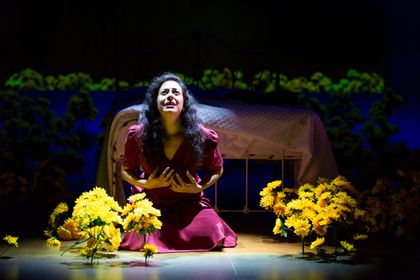 It is fitting that among the parts Lopez plays is that of a high priestess presiding over a fertility ritual for Yerma, since it is Lopez who has co-conceived, and delivered Lorca’s mythic tale to earth in a new accessible modern translation, equal parts poetic and prosaic.
It is fitting that among the parts Lopez plays is that of a high priestess presiding over a fertility ritual for Yerma, since it is Lopez who has co-conceived, and delivered Lorca’s mythic tale to earth in a new accessible modern translation, equal parts poetic and prosaic.
Co-conceived and elegantly directed by Melia Bensussen, the play is infused with Mark Bennet’s sex & death flamenco-inflected melodies played live in the shadowy foreground by Juanito Pascual on guitar and Fabio Pirozzolo on percussion. It took me awhile to adjust to the strange cadence of the dialogue, poetry delivered like casual speech. Some of it is ravishing: “the sheets smell like apples,” and some a tad lumpy: “….he was a beefy kid” in reference to Victor, Yerma’s beloved childhood friend who later appears as a bullish progenitor in horns at a fertility feast.
Scenes shift between the real and the magical. I’m not always sure where we are as Yerma hopes against hope for a son, a dream so real she sings to him even as the dream recedes. YERMA conjures archetypal womanhood in all her guises and attendant carnal wisdom and magical powers: mother, wife, crone, spinster–here embodied by an ensemble of female players which needed more time to gel.
Yerma is played by the sweet-voice Nadine Malouf who invests the title character with her requisite sensuality and seriousness, but not the grandeur the part cries out for: a monumental tragic heroine whose deepest desires are thwarted who claims her only power in a final, desperate act. Among the tribe of women with whom she interacts, Marianna Bassham is funny and tender as Maria her ultra fecund friend who apparently needs but a glance from her husband to get pregnant. Alma Cuervo is richly and hilariously overripe as Incarnacion a lusty, experienced woman who suggests Yerma is sleeping with the wrong man.
Indeed, Yerma’s dutiful husband Juan (Christian Barillas) lean, cool, and all about the business, fails to make Yerma’s heart beat fast. Her childhood friend Victor (Ernie Pruneda) however, is softer, warmer, and knows her soul. That Yerma has chosen the wrong mate and her body rebels is never in doubt, but there is no solution to the dilemma provided by Lorca or Lopez as Yerma struggles between cultural duty and the more primitive truth of her creature self, and perhaps noblest calling.
I question the wisdom of the present-day setting; many of these problems could be solved by options available to modern women even in a rural environment. Is this Yerma’s destiny? Can she change it? Why stay in a claustrophobic relationship when the problem may not be Yerma, but rather, her mate; wiser women in her circle have suggested as much, and a solution seems just over the horizon. What IS the price of her making a new choice?
These questions are relevant now at a time when the very nature of what it means to be feminine or masculine is in flux, and the very implications of these archetypes are in transition. If we are to understand the depth of the choices Yerma makes, we must feel compelled to embrace the reasons that lead her there.
Ironically, the less specific the time and place (and it is only barely sketched out here) the more this work expands, taking in the larger classic conflicts between society and the individual, men and women (it could be argued that a patriarchal system has imprisoned Yerma) between body and spirit, the immediate and the eternal…
Despite my reservations, I was mesmerized by the sheer beauty of the production, its elemental set, ravishing lighting, and the mystery of the material. I overlooked some of the lumpy transitions and tonal shifts. As we neared the end of what Lorca called a “tragic poem,” that sea of yellow dandelion weeds pushing up between the cracks toward life, had all been plucked and gathered by these women, leaving a barren landscape and Yerma withered and alone. I was spent and surrendering and invite you to see it and question with me. Presented by THE HUNTINGTON THEATRE COMPANY at the BCA Calderwood Pavilion through June 30.


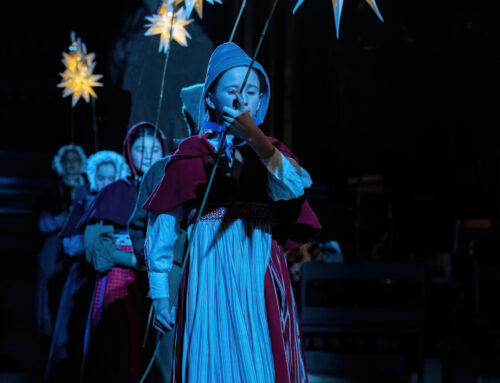
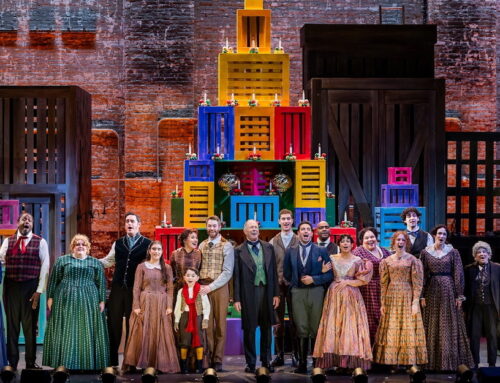
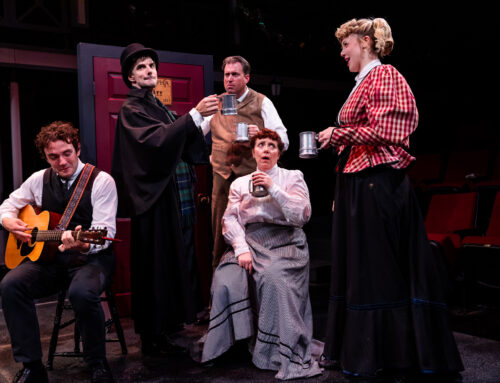
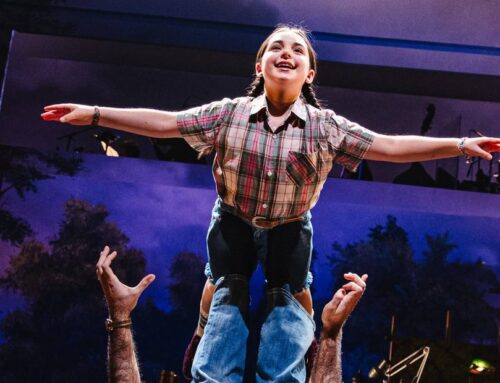
Leave A Comment
You must be logged in to post a comment.